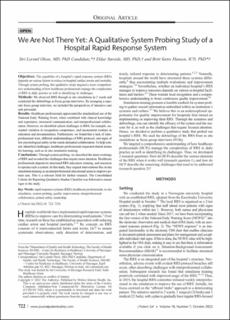| dc.contributor.author | Olsen, Siri Lerstøl | |
| dc.contributor.author | Søreide, Eldar | |
| dc.contributor.author | Hansen, Britt Sætre | |
| dc.date.accessioned | 2023-04-03T09:52:07Z | |
| dc.date.available | 2023-04-03T09:52:07Z | |
| dc.date.created | 2022-10-26T18:28:37Z | |
| dc.date.issued | 2022 | |
| dc.identifier.citation | Olsen, S. L., Søreide, E., & Hansen, B. S. (2022). We are not there yet: a qualitative system probing study of a hospital rapid response system. Journal of Patient Safety, 18(7), 722-729. | en_US |
| dc.identifier.issn | 1549-8417 | |
| dc.identifier.uri | https://hdl.handle.net/11250/3061739 | |
| dc.description.abstract | Objectives
The capability of a hospital’s rapid response system (RRS) depends on various factors to reduce in-hospital cardiac arrests and mortality. Through system probing, this qualitative study targeted a more comprehensive understanding of how healthcare professionals manage the complexities of RRS in daily practice as well as identifying its challenges.
Methods
We observed RRS through in situ simulations in 2 wards and conducted the debriefings as focus group interviews. By arranging a separate focus group interview, we included the perspectives of intensive care unit personnel.
Results
Healthcare professionals appreciated the standardized use of the National Early Warning Score, when combined with clinical knowledge and experience, structured communication, and interprofessional collaboration. However, we identified salient challenges in RRS, for example, unwanted variation in recognition competence, and inconsistent routines in education and documentation. Furthermore, we found that a lack of interprofessional trust, different understandings of RRS protocol, and signs of low psychological safety in the wards disrupted collaboration. To help remedy identified challenges, healthcare professionals requested shared arenas for learning, such as in situ simulation training.
Conclusions
Through system probing, we described the inner workings of RRS and revealed the challenges that require more attention. Healthcare professionals depend on structured RRS education, training, and resources to operate such a system. In this study, they request interventions like in situ simulation training as an interprofessional educational arena to improve patient care. This is a relevant field for further research. The Consolidated Criteria for Reporting Qualitative Studies Checklist was followed to ensure rigor in the study. | en_US |
| dc.language.iso | eng | en_US |
| dc.publisher | Lippincott Wolters Kluwer | en_US |
| dc.rights | Navngivelse 4.0 Internasjonal | * |
| dc.rights.uri | http://creativecommons.org/licenses/by/4.0/deed.no | * |
| dc.title | We Are Not There Yet: A Qualitative System Probing Study of a Hospital Rapid Response System | en_US |
| dc.type | Peer reviewed | en_US |
| dc.type | Journal article | en_US |
| dc.description.version | publishedVersion | en_US |
| dc.rights.holder | The authors | en_US |
| dc.subject.nsi | VDP::Medisinske Fag: 700 | en_US |
| dc.source.pagenumber | 722-729 | en_US |
| dc.source.volume | 18 | en_US |
| dc.source.journal | Journal of patient safety | en_US |
| dc.source.issue | 7 | en_US |
| dc.identifier.doi | 10.1097/PTS.0000000000001000 | |
| dc.identifier.cristin | 2065385 | |
| cristin.ispublished | true | |
| cristin.fulltext | original | |
| cristin.qualitycode | 1 | |

